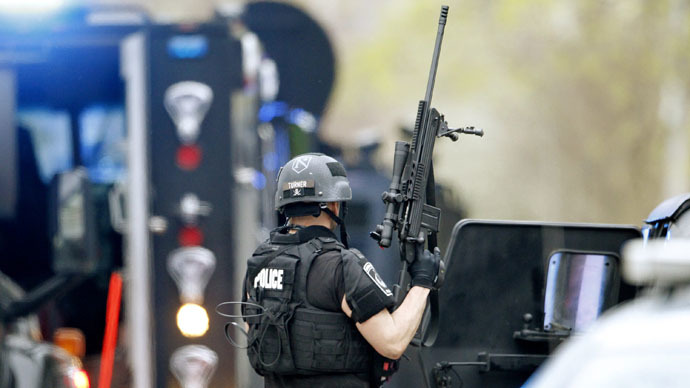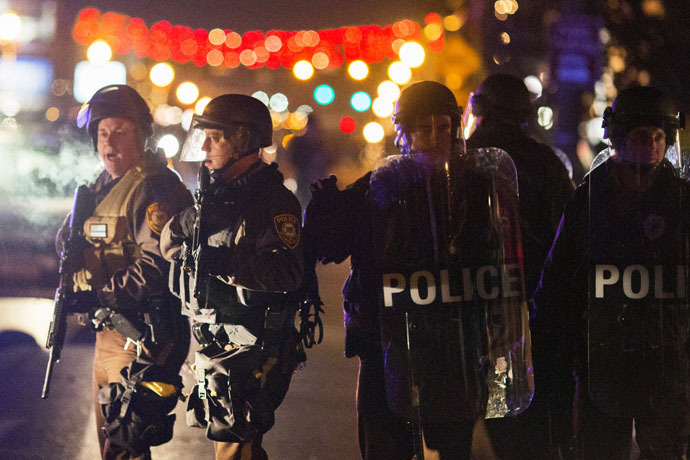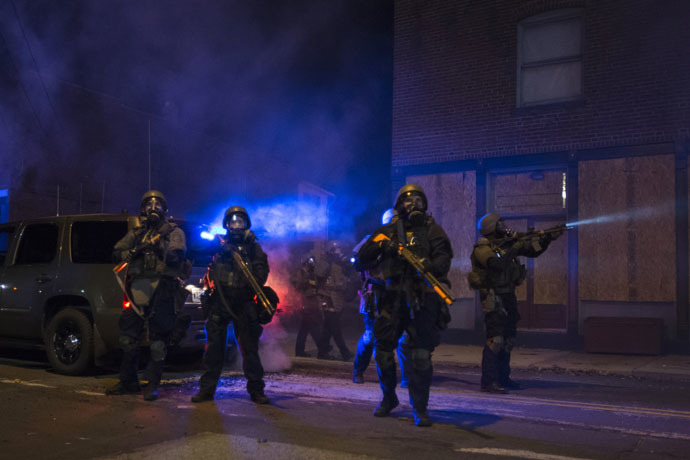New Hampshire bill proposes ban on police receiving military-grade weapons

In response to increasing police militarization in the US, legislation proposed in the New Hampshire state House would implement a ban on state and local officials obtaining or using certain military weaponry acquired from the Pentagon or other sources.
New Hampshire House Bill 407 -- the Police Equipment and Community Engagement Act -- would bar officials from possessing any military equipment “not readily available in an open national commercial market.”
The bill’s sponsor, State Rep. J.R. Hoell, clarified this further to mean over-the-counter availability, according to the Tenth Amendment Center.
As RT has previously reported, local police forces across the United States have benefited from the militarized mindset of the post-9/11, “war on terror” era, as wars in Iraq and Afghanistan and funding from the likes of the US Department of Homeland Security have resulted in a mass proliferation of military-grade weaponry.
READ MORE: 'Less-than-lethal' ammunition makers profiting off unrest from Ferguson to Israel

One way the US government distributes combat gear to local police departments is through the US Department of Defense’s 1033 program, in which the Pentagon offers hundreds of millions of dollars of surplus military equipment to police forces throughout the US. For instance, St. Louis County -- which encompasses the city of Ferguson, where citizens fought heavily-armed law enforcement following the fatal police shooting of an unarmed black teenager in August -- is part of the program, as RT has reported.
HB207 states that “no state agency or political subdivision of this state shall acquire, purchase, or otherwise accept for use any military-equipped vehicle or military grade hardware, including but not limited to armored personnel carriers, Title II weapons, unmanned aerial vehicles, or unmanned ground vehicles, unless such military grade vehicle or hardware is readily available in an open national commercial market. The adjutant general shall notify the state attorney general of a violation of this paragraph. Any military-equipped vehicle or military grade hardware acquired in violation hereof shall be forfeited.”
Nearly half of Americans support demilitarizing police – poll http://t.co/CVsr1LWbXepic.twitter.com/kyW2ASJhOW
— RT America (@RT_America) January 22, 2015
New Hampshire’s HB407, which has bipartisan support, would effectively bring the state’s participation in the 1033 program to an end. The program has supplied New Hampshire localities with more than $6,000,000 in military gear, the legislation’s text states.
“New Hampshire cities and towns are required to repair and maintain this additional military grade hardware that consumes limited town and city funds that are needed for other functions.”
The bill would allow exceptions for the governor to arm the state’s National Guard.
READ MORE: Police agencies that use military weapons at riots may be forced to repay federal grants
Close to 200 state and local police departments in the US have lost military-level equipment transferred to them by the Pentagon’s 1033 program, according to a recent independent investigation.
In response to national outrage over the utilization of military weaponry by police in Ferguson - which is emblematic of police forces across the nation - some in Washington have mulled stemming the flow of Pentagon excess to towns across America. Yet powerful police lobbies are mobilizing to beat back any anti-militarization sentiment resulting from scenes and accounts in Ferguson.
I felt #Ferguson had their eye on ball when the focus was on militarization of police. Any fed actions demilitarizing police? @cspanwj
— still an individual (@CSPANJNKY) January 27, 2015
With the mass amount of equipment available to police forces, an aggressive tactical attitude has followed, as shown by the growth of SWAT team units across the US.
Created in the late 1960s as “quasi-militaristic” units designed to handle emergency situations such as riots, hostage scenarios, and active shooter situations, the number of SWAT squads have since surged, and are “used with greater frequency and, increasingly, for purposes for which they were not originally intended—overwhelmingly to serve search warrants in drug investigations,” according to a recent ACLU report, entitled ‘War Comes Home: The Excessive Militarization of American Policing.’

The 98-page report details the militarization of state and local law enforcement agencies, courtesy of expensive federal programs, which are dispensing “weapons and tactics of war, with almost no public discussion or oversight.” Although explicitly aimed at fighting drugs, the strategy is backfiring, sowing fear and discord among citizens, many of whom fear police as much as criminals.
Across the US, citizens have taken notice -- and action -- to counter police militarization in ways not as dramatic as the civil uprising in Ferguson. For example, officials in Davis, California, voted in August to get rid of the local police department’s Pentagon-supplied armored vehicle.
In one small Michigan town, citizens have sought an investigation into the local police department’s acquisition of two armored personnel carriers and two Humvees, courtesy of the Pentagon.
In Salinas, California, residents expressed outrage in late 2013 over a $650,000 heavily-armored vehicle gifted to the police department through the 1033 redistribution program. The truck was used in Iraq and Afghanistan, according to local reports.












